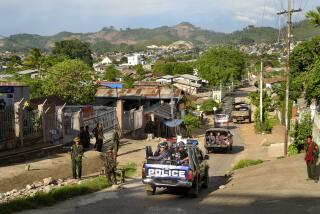Congo troops, U.N. force drive M23 rebels from last bastion
JOHANNESBURG, South Africa â Congolese troops backed by a U.N. force on Wednesday drove insurgents from the M23 group from their last stronghold in eastern Congo, raising hopes that the government might defeat the rebels and begin to bring some stability to the troubled region.
Bertrand Bisimwa, civilian leader with the M23 rebels, reportedly fled across the border into Uganda, with Congolese officials calling on authorities there to hand him over.
The fall of Bunagana, the rebelsâ headquarters, follows intense fighting in the eastern reaches of the Democratic Republic of Congo after the collapse of peace talks last week over M23âs demands that its leaders receive amnesty. In recent days, Congolese forces have seized control of successive towns in the east, and U.N. agencies report that thousands of civilians have fled the fighting.
M23âs reversal was stunning and swift, and underscores the success of a new United Nations approach in the area after the deployment of a new, more aggressive and focused U.N. intervention force with a stronger mandate to fight armed militias threatening civilians.
The groupâs setback also underscores the determination of regional leaders, including South African President Jacob Zuma, to stabilize the troubled region, which has been mired for decades in conflict and poverty. South African and Tanzanian forces form the backbone of the 3,000-strong intervention force.
Congolese President Joseph Kabila had made it clear that M23 leaders wanted for crimes against humanity would not receive amnesty or be integrated into the national army, as had been negotiated in previous peace agreements.
M23 emerged in April 2012 and took control of a large swath of eastern Congo, including the city of Goma last November for 10 days, reportedly funding its advances with gold and other minerals from the resource-rich territory. But the group was riven by infighting, underscored when one of the main M23 leaders, Bosco Ntaganda, surrendered at the U.S. Embassy in Rwanda in March. He was handed over to the International Criminal Court in The Hague to face charges of crimes against humanity.
Rwanda, which U.N. experts believe helps arm, fund and lead M23, has been under severe pressure from the White House and State Department to stop backing a group whose leaders are accused of war crimes, including recruitment of child soldiers. Rwanda, which is accused of backing M23 as a counter to anti-Rwandan rebels based in the east and even of coveting control of the resource-rich area, has always denied involvement.
Analyst Ben Shepherd, of the London-based think tank Chatham House, said M23âs loss of Bunagana was a major development that provided a window for the international community to try to bring peace to the region.
âItâs interesting to think that this may mark the genuine moment when Congo becomes a post-conflict country,â Shepherd said, adding that the outright defeat of a Rwandan-backed militia was unprecedented.
He said the support of the U.N. intervention force by regional leaders made it difficult for Rwanda to continue backing M23 or another militia in Congo.
âFor Rwanda to now attempt to go back to the same playbook that they used in the region in the late â90s, I think theyâd find that very difficult, because the patternâs become familiar and itâs become increasingly hard for them to avoid those allegations,â he said.
âThe tectonic plates of the region shifting is inescapable, and itâs quite hard to see circumstances under which youâd get a repetition of the same old pattern of foreign-sponsored armed groups.â
The next key issue is whether Congolese and U.N. forces will move to confront and defeat the myriad remaining armed groups in the region, notably the Democratic Forces for the Liberation of Rwanda, or FDLR, which includes some leaders of the 1994 genocide in Rwanda and is seen by Rwanda as a serious threat.
Human Rights Watch researcher in eastern Congo Ida Sawyer said the U.N. intervention brigade, with its tougher approach to militias, was a turning point in M23âs rollback.
âI think with the M23 theyâve shown that theyâre willing to take more risks and be more robust than the U.N. peacekeepers here have in the past,â Sawyer said. âThe key challenge will be how the government is able to hold new territories that are taken over from armed groups and establish capability. A key weakness is the almost nonexistence of state authority and control in much of eastern Congo.â
Sawyer said one of the reasons that the region had lapsed back into conflict so many times was the past practice of offering amnesties to rebel leaders and folding their fighters back into the army.
âI think weâre getting there in terms of starting to address the root causes that have allowed the conflict to continue for so long, and one of those issues is impunity and the cycle of integrating rebels into the army, rewarding war criminals and zero accountability for abuses,â Sawyer said. âAt least one positive sign is that the government is saying the right thing about ending impunity and about accountability for army abuses as well as rebel leadersâ accountability for abuses.â
The M23 Twitter feed said Tuesday that its retreat was strategic and not a sign of weakness. The rebels vowed that they would emerge victorious.
âThose who think dat M23 is finishd sees near like pig, But eagles who sees far knos that dis is the begining of the most waited Battle,â the group tweeted Wednesday, using Twitter shorthand.
But analysts dismissed M23âs assertion, saying the rebels had abandoned areas it only recently fortified and had clearly suffered a crushing loss. The U.N.âs impending deployment of its first drone in eastern Congo also will make it difficult for M23 to regroup in force.
More to Read
Sign up for Essential California
The most important California stories and recommendations in your inbox every morning.
You may occasionally receive promotional content from the Los Angeles Times.










